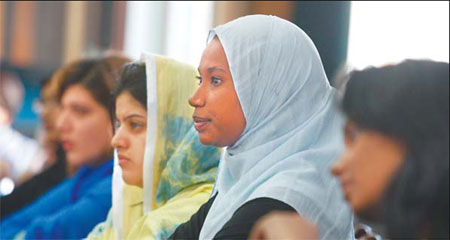Eating pilaf and drinking yogurt, Muhammad Asim Ijaz, a junior student from Pakistan, feels at home in Xinjiang Medical University (XMU).
"It seems like getting world-class medical education without going abroad," the 22-year-old said. In two years he will return to his motherland after receiving a bachelor degree in clinical science.
 |
|
Foreign students of Xinjiang Medical University |
About 150 foreign students like Ijaz enter the university annually for medical education. More than 600 students from Pakistan, Russia, Japan and Sudan are currently studying in the university.
XMU is a comprehensive medical school integrating education, research and clinical treatment with five affiliated teaching hospitals in the region that practice both Western and traditional Chinese medicine. It also collaborates with faculty from Harvard Medical School to develop innovative research and educational programs.
Groundbreaking on XMU - formerly called Xinjiang Medical College - commenced construction in 1954 and was completed in 1956, when its first students were recruited.
Ratified by the Ministry of Education in 1998 and entitled by former President Jiang Zemin, XMU then incorporated Xinjiang Medical College and the College of Traditional Chinese Medicine.
"XMU is currently forging ahead to stay in the vanguard of medical progress among its peers in China and top in the northwest, which has great influence in neighboring countries," said Hasiyeti Aili, general secretary of the school.
Its graduates are very well-regarded in Pakistan, Ijaz said.
A bright future is not the only attraction. Mirja Usman, 24, a junior at the university, said his life in Xinjiang has been "a golden time".
In addition to foreign students, more than 80 percent of the school's graduates have found jobs in the past three years.
XMU offers 27 majors, including clinical, preclinical and basic medicine to more than 18,000 students. Its staff of 10,000 includes 1,700 teachers, according to statistics from the school.
XMU recruits students for undergraduate program from 15 provinces, municipalities and autonomous regions. It has undoubtedly become a top university in Xinjiang Uygur autonomous region, Aili said.
It has three post-doctoral programs, four doctor degree authorization centers and five for master's degrees.
Foreign teachers also praise the school's education and environment. Olga Mroz, an English teacher from Hungary who has stayed in Xinjiang for a year, said that the school provides a good stage to foreign students and teachers.
As well as hiring foreign talent, the university also has cooperation programs with scores of domestic and foreign schools. Nearly 600 students from the university have been sent abroad for further education.
(China Daily May 20, 2009)